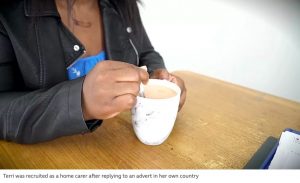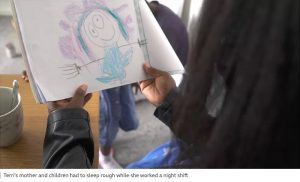The number of modern slavery cases reported within the UK care industry has more than doubled in the past year.
There were 109 potential victims, exploited for personal or financial gain, between January and March – twice as many as the same period in 2022.
BBC File on 4 obtained the figures from the government-approved anti-slavery helpline, run by charity Unseen.
Investigators trying to protect workers from being exploited say the care industry is now a “top priority”.
The Gangmasters and Labour Abuse Authority (GLAA) – whose role is to protect workers from labour exploitation across the UK – told us there were 17 ongoing care sector investigations and that it was looking at more than 300 pieces of intelligence.
Unseen says the rise in calls about the care sector in the past 12 months is because the government has made it easier for overseas social care staff to work in the UK post-Brexit – and fill thousands of job vacancies.
As the supply chain gets bigger, there’s more chance for exploitation – says the charity.
In the year to March, the government had issued 102,000 skilled worker, health and care visas to foreign workers – that’s up 171% on the previous year. In a statement, it told File on 4 that more than £17.8m had been spent policing modern slavery since 2016.
It’s very rare to hear from a victim of modern slavery in person, but one woman who came to the UK on a work visa – and was forced to work gruelling hours as a carer – has told us her story.

Still frightened of her former employers, we’re calling her Terri to protect her identity.
Recruited by an agency in her home country in Africa, Terri was offered work in the UK as a domiciliary carer. The agency told her it would arrange her work visa and transport.
She was interviewed in person, took an English test, and had to provide proof of her work experience. She was promised a job as a care assistant in the UK through a care company. She was told she would earn up to £29,000.
For Terri, who was in an abusive marriage, the job was the perfect opportunity to escape with her three children.
“Butterflies were going through me, it was one of the best days of my life,” she says.
Terri brought her mother with her to the UK, so she could look after Terri’s children. Although Terri would be provided with somewhere to stay through the care company, depending on where she was asked to work, the children and their grandmother went into private rented accommodation.
Terri told us she found her work hours gruelling – up to 20 hours a day – and that she often worked seven days a week. The car she had been promised to travel between clients did not materialise, so she had to walk to appointments.
When Terri eventually received her wages from the company two months later, it worked out at less than £2 an hour, which is illegal. Care workers (aged 23 or over) must be paid at least the National Living Wage of £10.42 – for their time at appointments, plus travel time to and from the office.
Terri complained to the care company but it threatened to stop her work and cancel her visa.
She says other carers she got to know also warned her that the firm’s owner had political links in her home country.
“That makes him very dangerous where we come from – you don’t want to go against someone like that,” she told us.
Her low pay meant she was unable to continue paying rent for her mum and children – and they were forced to leave their accommodation.
Terri was on a night shift while her mother and children spent the night on the streets. They were spotted by a member of the public and Terri was reported to social services.
When they asked to see her rota they were shocked. “This is too much, this is insane,” she says they told her.
Social services helped Terri get placed in the National Referral Mechanism, the government system set up to identify and support victims of modern slavery.
She and her family are now in accommodation provided by social services and are being helped by the charity, Causeway. Terri is now seeking asylum in the UK – and until a decision is made she isn’t allowed to work.
The Home Office has told her she has “reasonable grounds” to prove she was a victim of modern slavery.

The care company Terri worked for is currently being investigated by another government department over the UK’s skilled worker visa scheme, says Ian Waterfield, Head of Enforcement at the government-sponsored GLAA. He says the care industry has gone from “not being on their radar” to becoming a “top priority” in the past 18 months.
Modern slavery has infiltrated several employment sectors – including construction and car washes.
The total number of potential victims referred to the Home Office through the National Referral Mechanism in 2022 was almost 17,000 – the highest number ever recorded.
The National Police Chief’s Council told us it had a dedicated team leading work to “understand and tackle” the problem – and that currently there were more than 3,500 active investigations across England and Wales.
However, prosecuting cases is difficult. Last year, England and Wales police forces logged nearly 10,000 cases. But half of these were closed because offenders couldn’t be tracked down and less than 2% resulted in charges.
“Victims of modern slavery are extremely vulnerable,” says Sara Thornton, the former Independent Anti-Slavery Commissioner.
“They will be in terror of the people who’ve trafficked or enslaved them, who will tell them there’s no point going to the police or the local authority or a charity because they won’t support you.”
Ms Thornton says the Illegal Migration Bill – which passed into law last week – will make it even harder to support vulnerable victims. The new law allows the government to legally detain and remove all people who unlawfully enter the UK.
She believes traffickers will use this to persuade their victims not to go to the police, adding that she thinks it is “a grave, grave concern” that there is currently no anti-slavery commissioner in place.
Terri is still haunted by her experience. “There are times when I still have nightmares about what went down at that job,” she says.
She now wants to qualify as a nurse.
Correction: Based on GLAA figures, an earlier version of this article stated there were 300 ongoing care sector investigations. The GLAA has since corrected that figure to us, to 17 investigations and more than 300 pieces of intelligence. The article has been updated accordingly.
Reporting by: Matt Pintus, Phil Marzouk, Datshiane Navanayagam and Melanie Stewart-Smith
